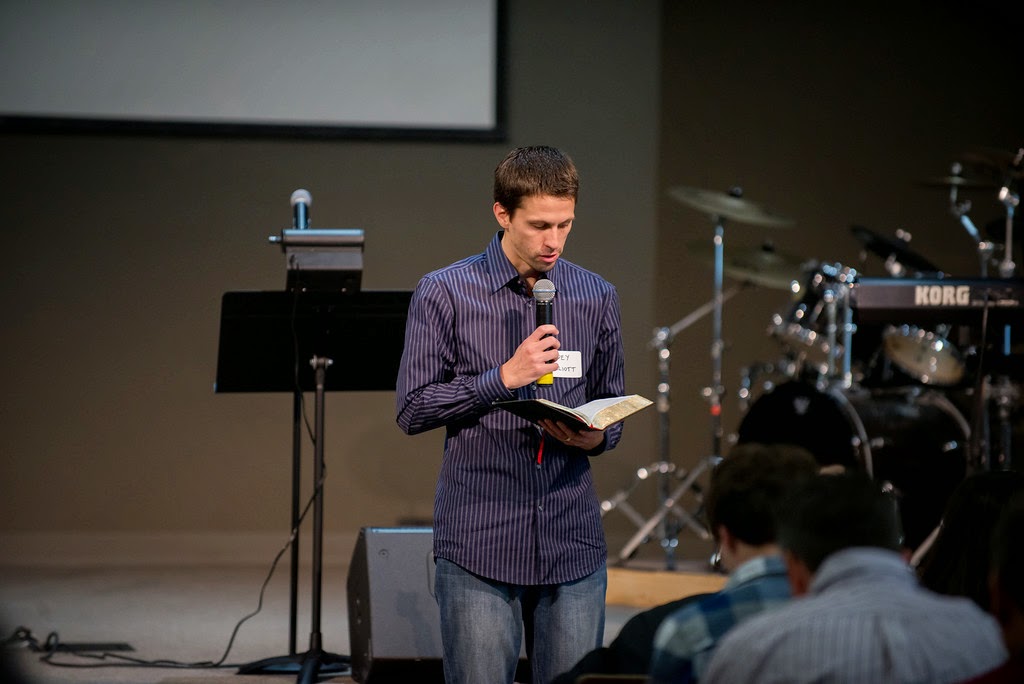So now I have read
The Shack. There are a lot of good things in this book, and truly it is interesting as to a perspective on the most important being in the universe, namely the Triune God. It is emotional, especially at the beginning, and then it is deep, penetrating, and revealing throughout. You will be better, and not worse, off from reading it. My favorite exchange is between Mack and the three members of the Trinity, because it reminds me of the powerful truth found in Romans 8:
“Look at the cost – all the pain, all the suffering, everything that is so terrible and evil….and look what it has cost you. Is it worth it?” “Yes!” came the unanimous, joyful response of all three.
If it does nothing else, the book does make you long for a true, lasting, living relationship with God, who is uniquely and mysteriously in a relationship within Himself. This is convicting for me. As I was reading it, I struggled to pinpoint exactly what it was about the book that I most enjoyed, or most connected with. Was it the characters? Yes, maybe, but in the end, they were not real. Even the Godhead, who is real, was only a fictional interpretation here. Was it the detailed, narrative beauty of the writing and the pictures it painted? Yes, maybe, but in the end, these pictures fade away when the book is not in front of you. After pondering, I realized it was the
truth in which I most connected to, and most warmed my heart. The truth lasts. It was the truth that God exists in three persons, and this concept is mysterious and glorious beyond words. It was the truth that this same God is working out all things together for good for those who love him, even in the abduction and murder of a little girl. Those truths do my heart good. Imagine, if those truths were not true. Imagine, if the abduction and murder of a little girl was only a random act of violence that had no meaning, no purpose, and had nothing from which to derive comfort. Sure, we as humans appeal to God, and ask why these things have to happen at all to accomplish His ultimate good. And we lose faith sometimes in our confusion. But isn’t it so much better that there is purpose and comfort and hope in these types of evils? What a frightening thought that such things could happen outside the will of the God of the Universe. I choose the
Sovereign God any day of the week, and will brace myself for what that means, because the truth is worth it, and it is ultimately where my joy comes from anyway.
So then, it is the truth that I most like about
The Shack. But alas, it is also the truth in which I am the most frustrated. I still ultimately agree with the review written by
Tim Challies that I
posted before. There still are theological errors in this book, and the errors matter. Without the errors, the book would have been better. It makes me wonder in general why the temptation is so strong to fabricate or reduce or theorize the truth when the truth is clear and in its entirety is better. My general synopsis is this: God is more holy, we are more sinful, the Bible is more preeminent, and the cross is more central (and shocking and appalling and glorious) than the author of
The Shack would lead you to believe. I can accept that his intentions were good and that some readers will benefit from his story, but I believe more people would benefit, and it would be more helpful, encouraging, and fruitful for the reader if these things were magnified and not undermined. The most striking example to me is the following excerpt:
“Don’t ever think that what my son chose to do didn’t cost us dearly. Love always leaves a significant mark. We were there together.” Mack was surprised. “At the cross? Now wait, I thought you left him – you know – ‘My God, My God, why hast thou forsaken me?’” It was a Scripture that often haunted Mack in The Great Sadness (his daughter’s death). “You misunderstand the mystery there. Regardless of what he felt at that moment, I never left him.”This is not true. The Bible teaches that the Father
did forsake the Son when He poured out the wrath that we deserved at Calvary. If this is not what happened, then the accomplishment on the cross was something less than the once-for-all, complete, definite, substitutionary sacrifice that otherwise we justly deserve. The Gospel is incomplete and downright insufficient if those agonizing words from Jesus on the cross were not literally true. The fact that the Father
did forsake the Son is kind of the whole point; otherwise the sacrifice would not have been
completely in our place, because our sin deserves
complete separation from God, and only by Jesus stepping in that place do we have any hope.
Responding to the claim that everything sinful and agonizing would be forgotten in heaven and in eternity (which would include Calvary), John Piper says, “Calvary will not be forgotten! Hell exists, sin exists, the cross exists, heaven exists, we exist,
everything exists to magnify the worth of the Scream of the Damned! That is the whole point of the universe!” The
Scream of the Damned; a description of those infamous words at the cross used originally by R.C. Sproul, and further by
C.J. Mahaney and Randy Alcorn, to reinforce the shocking revelation we see through this event. If the Savior’s scream on the cross is explained as anything less than the agony of being forsaken by His Father, for a time, to completely and definitely be our substitute and absorb the wrath we deserve, than the Gospel is diluted, the good news is less good, and the whole point of the universe is missed.
Make no mistake, I fall on my knees in awe and surrender at the implications of what I am saying. I take no pleasure in making the allegation that some people miss the whole point of the universe. I also fall on my knees as I am convicted of daily, reminded of often, and strive to remember always that I don’t want to love studying God more than I love God himself. I don’t ever want to be so into doctrine and theological interpretations that I neglect a personal relationship with my Lord and Savior. I don’t only want to know Him through propositional truth, but also as Wonderful Counselor, Everlasting God, and Prince of Peace.
“There are a lot of smart people who are able to say a lot of right things from their brain because they have been told what the right answers are, but they don’t know me at all. So really, how can their answers be right even if they are right, if you understand my drift?”
I
do think that my relationship is deepened by focusing on doctrine and theology, and I do believe He can (and has to) be known through propositional truth, but it should never be at the expense of the relationship itself. Additionally, I don’t want to ever love the gifts of God more than God himself. I don’t ever want eternal life, escape from hell, forgiveness of sins, reconciliation with family and friends, heaven, social justice, etc. to be so much my focus that I lose the source of all those things. Those gifts are precious beyond words, but not more precious than the God who makes them possible.
I don’t want to discourage the helpfulness of this book, especially to those who seek an answer to or comfort from suffering. And I also don’t want to assume that
The Shack was written by a theologian for a specific theological purpose, because I know it wasn’t. But I think that like
The Pilgrim’s Progress, fictional accounts of this nature have some level of purpose of expressing truth for the spiritual benefit (or consideration) of others. I believe that the author of
The Shack, while not attempting to make truth claims, had the intention of using a narrative to interpret truth. (And good for him; thousands of people will be encouraged by that to the glory of God). Or maybe he didn’t mean to address theology, but he did nonetheless. When someone, even through fiction, put words into the mouth of God, which the author of
The Shack clearly did, that person is addressing theology and means to say something about who God is and what He would say. Outside of the Bible, if you do this, you have to understand the fact that you could be wrong about some things; and wrong in a way that is dangerous.
Theology will never only be scholarly; it will always also be practical, because God is sovereign, and involved in the details and experiences of our life. If someone at the store says in frustration while waiting in line, “Jesus Christ, come on already!” that person just addressed theology. “Where is God when the line is a million people long and I have to get to school to pick up my kids? Why would he let that happen? I can’t understand a God like that.” Silly, maybe, but a simple example of the ubiquitous reality of theology in our lives.
I don’t automatically believe that seminary or formal theological education is necessary to write books or serve in a church (or write on blogs, obviously, or I would be a hypocrite). But the reason I think it is a popular prerequisite is because it shows a commitment to interpret and apply truth with truth (assuming “seminary” is most fundamentally and generally a prolonged study of the Bible in various ways, and the person of Jesus Christ, who is the way, the
truth, and the life). To interpret and apply truth with experience, or culture, or our immediate surroundings, or our own creative imagination is not
always wrong, but it is
more likely wrong than using the entire Bible first, and these things second. And truth is not just true; it is helpful – more helpful than untruth.
I passionately believe that a true understanding about God and a theology of who God is and how He works in our lives, as revealed in the entire Bible, is better, and more comforting than a less than true understanding. In other words, I don’t think we as Christians should put the Bible aside and just imagine the true nature of God and the true meaning of His sovereignty, or goodness, or love, especially in suffering. I don’t want to get God off the hook for suffering or misunderstand the nature and purpose of it if His ultimate, eternal plan through suffering is much better than the alternative, which I believe it is. Parts of
The Shack refreshingly confirm this reality. I don’t want to expect God to reveal himself separately from the Bible if his revelation
in the Bible and the implications of that revelation fulfills the deepest longings of my soul, which I believe it does. I don’t want to explain the mystery of the Trinity in a way that is
close to true in regard to roles, hierarchy and distinction, when an explanation that is
more true presents a Godhead that is the culmination of every desire I’ve ever had and every relationship I’ve ever pursued, which I believe He is. So in that sense, I don’t necessarily believe certain theological errors relating to revelation, salvation, and the Trinity in
The Shack are altogether dangerous, but that they just take a little away from the potential comfort and helpfulness of the entirety of God’s truth.
In my brief tinkering with theology, I have seen that the error of reductionism (which means not necessarily saying things that are untrue, but not saying
everything the Bible says about a particular subject) is not only flawed, but also unhelpful. It would be more helpful, and more comforting, and more encouraging to say everything that the Bible says about a subject, like the nature of God, or suffering. To truly believe in the sovereignty of God means to believe that His plan, which He is working together for good in all things for those who love Him, is the “best of all possible worlds”, as
John Piper would say; even as hard as that is to believe or accept in the face of unthinkable suffering, such as the abduction and murder of an innocent little girl. We see now in a mirror dimly; but
then, we will see face to face.
Alongside Paul, I am convinced that these present sufferings are not worthy to be compared to the glory that will be revealed in us, and that these light and momentary troubles are achieving for us an eternal weight of glory far beyond all comparison, as we wait for the things that are unseen, namely, the Triune God and His coming kingdom. With or the without
The Shack, I hope this is your heart and perspective day in and day out.



